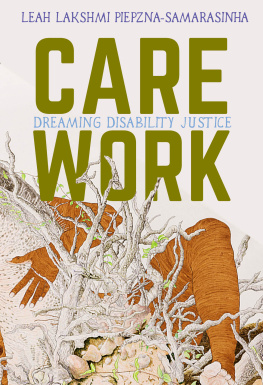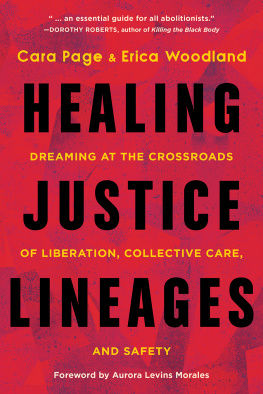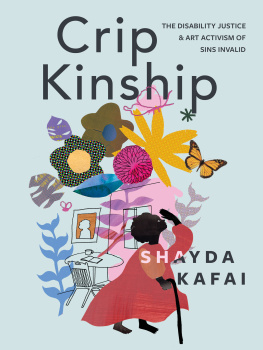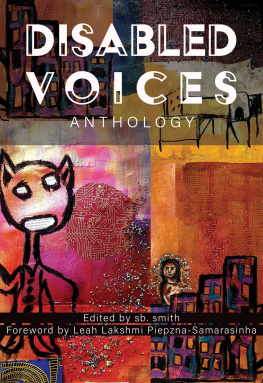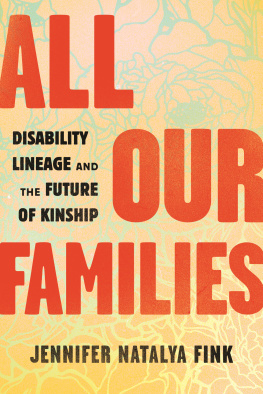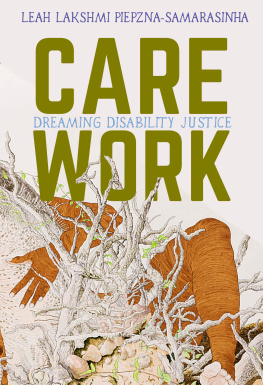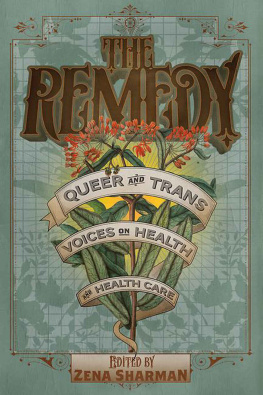
MORE PRAISE FOR CARE WORK
Im overjoyed that artists and activists like Leah are writing books like this one that helps water the roots of Disability Justice. This book is coming from the bed, the streets, and on stages where Leah has spoke, taught, performed, and struggled onthats why its so accessible and brings lived knowledge into our outdated, stiff institutions and activist movements. In this era of hyper-capitalism, toxic hyper-masculinity, and White supremacy, we desperately need Care Work.
Leroy F. Moore Jr., cofounder of Sins Invalid, cofounder of National Black Disability Coalition
Care Work is a necessary intervention for those in queer/trans people-of-color spaces and white disability spaces alike, but more importantly, its an offering of love to all of us living at multiple margins, between spaces of recognition and erasure, who desperately need what Leah has to say. This book is an invitation to dream and to build and to love, as slowly and imperfectly and unevenly as we need to.
Lydia X. Z. Brown, coeditor of All the Weight of Our Dreams: On Living Racialized Autism
We have mad crip dreams. In those dreams there exists a decolonized, liberated future in which none of our bodies and lives are disposable. Leah reminds us that turning these dreams into radical practices has already been done, is happening right now within disability justice movements, and will continue to build a future where we are all free. This book is a touchstone for our journey.
Qwo-Li Driskill, author of Asegi Stories: Cherokee Queer and Two-Spirit Memory
LEAH LAKSHMI PIEPZNA-SAMARASINHA
CARE
WORK
DREAMING DISABILITY JUSTICE

CARE WORK
Copyright 2018 by Leah Lakshmi Piepzna-Samarasinha
All rights reserved. No part of this book may be reproduced in any part by any meansgraphic, electronic, or mechanicalwithout the prior written permission of the publisher, except by a reviewer, who may use brief excerpts in a review, or in the case of photocopying in Canada, a license from Access Copyright.
ARSENAL PULP PRESS
Suite 202 211 East Georgia St.
Vancouver, BC V6A 1Z6
Canada
arsenalpulp.com
The publisher gratefully acknowledges the support of the Canada Council for the Arts and the British Columbia Arts Council for its publishing program, and the Government of Canada, and the Government of British Columbia (through the Book Publishing Tax Credit Program), for its publishing activities.

Arsenal Pulp Press acknowledges the xmkym (Musqueam), Swxw7mesh (Squamish), and slilwta (Tsleil-Waututh) Nations, speakers of Hulquminum/Halqemylem/hnqminm and custodians of the traditional, ancestral, and unceded territories where our office is located. We pay respect to their histories, traditions, and continuous living cultures and commit to accountability, respectful relations, and friendship.
Cover and text design by Oliver McPartlin
Cover illustration by TextaQueen
Edited by Lisa Factora-Borchers
Copy edited by Shirarose Wilensky
Proofread by Alison Strobel
Printed and bound in Canada
Library and Archives Canada Cataloguing in Publication:
Piepzna-Samarasinha, Leah Lakshmi, 1975, author
Care work : dreaming disability justice / Leah Lakshmi Piepzna-Samarasinha.
Issued in print and electronic formats.
ISBN 978-1-55152-738-3 (softcover).ISBN 978-1-55152-739-0 (HTML)
1. People with disabilities. 2. Social justice. I. Title.
HV1568.P54 2018 | 362.4 | C2018-901956-5
C2018-901957-3 |
I have loved disabled people of color my whole adult life and am still amazed to discover that the more I love our people, the more I remember where I come from. I remember that my ancestors found each other out, seeing each other in the unseen. My ancestors knew that asking after one another and making sure folks had what they need (what we might understand as collective access) was the only way to be together; together, the best shot at staying alive. My ancestors knew the power of vulnerability and how to hold each other in dignity. My ancestors knew joy. My ancestors made mistakes and meditated on who they wanted to be in community. My ancestors became those people.
Stacey Milbern
To the beloved, kindred, needed
CONTENTS
THANKS AND ACKNOWLEDGMENTS
This book was written in the matrix of many sick and disabled femme of color care webs, in unceded and occupied Tkaronto/Dish With One Spoon territories, Ohlone territories (Oakland, California), and my current home in South Seattle on Duwamish territories governed by the Treaty of Point Elliot, as well as on a lot of planes, trains, and Megabuses. No matter where I was paying rent, these pieces were mostly written in the majestic disabled revolutionary space of writing from my bed in old sleep pants. So thank you to this decolonial, queer, disabled bed space of wild disabled femme of color dreams.
This book is also emphatically not the product of a single smart and special persons brain. It was made through many community conversations, organizing efforts, arguments, fuckups, terrible challenges and Crazy brilliant ideas and leaps of faith. These ideas were crafted by collective disabled genius, science, and labor. I am not the one right kind of cripple, the kind that is convenient enough to nod at and ignore all the rest. I am all the rest.
So: thank you beyond measure to all the people who have collectively made the disability justice movement and communities, in meetings and at kitchen tables, in femmecaves and online. Thank you to Sins Invalid, disabled, sick, mad, and Deaf communities in Toronto, Oakland, Seattle, and beyond, the Sick and Disabled Queers, Autistic Queer/Trans People of Color, and SDQTPOC Facebook groups, the Deaf Poets Society, the Canaries, Harriet Tubman Collective, Krip-Hop Nation, Performance/Disability/Art (PDA), QPOCirus, Autistic Hoya, Disability Justice Collective Seattle, and GaySL. To cane and chair dancing circles in Toronto and beyond. To everyone who has participated and helped create the Frida and Harriets Children writing classes online. To the disabled femme artists and organizers, Black, brown, and working class, who mentored and mothered me as a young disabled femme of color writer and taught me how to steal office supplies, get grant money, and find jobs that left me time and spoons to writeLilith Finkler, Nalo Hopkinson, Elizabeth Ruth, and Patty Berne. Rest in power, Nicole Demerin.
There are many comrades and friends I owe my life and also the thinking and writing in this book to, and here are some: Stacey Milbern, Neve Kamilah Mazique-Bianco, Billie Rain, Lydia X. Z. Brown, Patty Berne, Leroy Moore, Jonah Aline Daniel, Qwo-Li Driskill, Aurora Levins Morales, Cyree Jarelle Johnson, Maria Palacios, Carolyn Lazard, Naima Niambi Lowe, Syrus Marcus Ware, Elena Rose, Meg Day, Elliott Fukui, Aaron Ambrose, Mia Mingus, Shayda Kaftal, Dolores Tejada, Setareh Mohammed, Luci Marie Powers, Aruna Zehra, Amirah Mizrahi, Adrian Nation, Aishah Amatullah, Inbar Frishman, Carrie Martha, Kai Cheng Thom, Lumpen Rolletariat, Gesig Selena Isaac, Loree Erickson, E.T. Russian, Ejeris Dixon, Liz Latty, Zavisha Chromicz, S.B. McKenna, Amalle Dublon, Tina Zavitsanos, you are the best friends for this journey, and I love being on it with you. Thank you to Lisa Amin and Chanelle Gallant for being my oldest sisters. To autistic and neurodivergent communities for welcoming me home.
Next page
